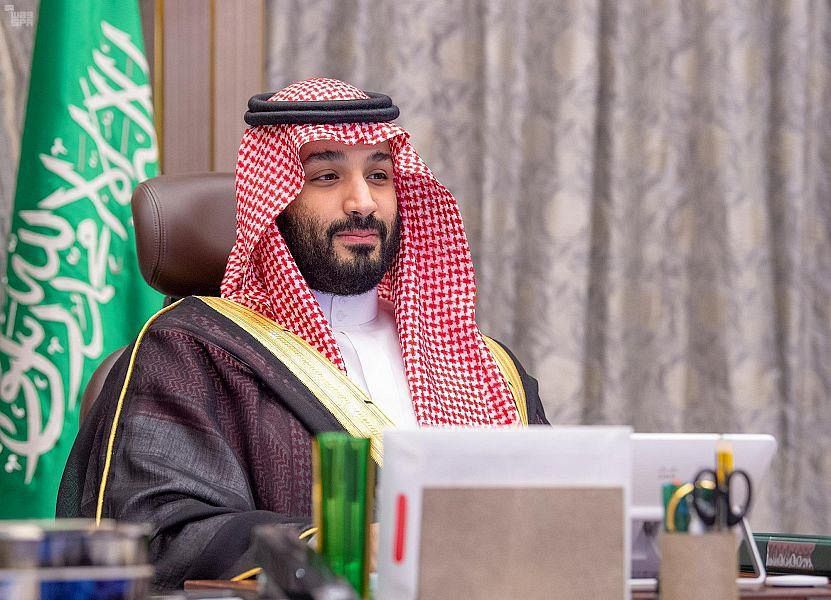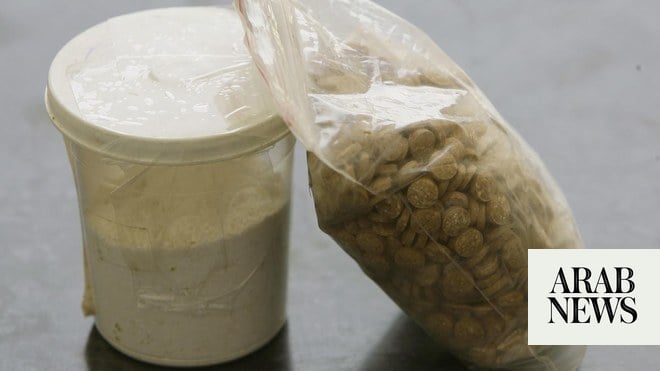
Iraqi Foreign Minister Mohammad Ali Al-Hakim, center left, raises the Saudi flag alongside Saudi Arabia’s Trade and Investment Minister Majed Al-Qasabi, second right, during the inauguration of the new Saudi consulate compound in the Green Zone of Baghdad on April 4, 2019. (AFP)
Relations between Saudi Arabia and Iraq have recently reached an advanced stage of rapprochement. The two nations have overcome the previous breakdown of relations, which had various causes, including the 2003 US invasion of Iraq and the subsequent reluctance of the Gulf states, led by Saudi Arabia, to enter the Iraqi arena due to the hostile policies of former Prime Minister Nouri Al-Maliki, which were directly dictated from Tehran.
After Haider Abadi came to power, relations between the two nations began to witness a cautious and gradual thaw. The last months of Abadi’s tenure saw an increase in the pace of improvement in the relations between the two countries. Now, under the new Iraqi government, relations have continued to improve, as both sides aim to overcome the previous diplomatic estrangement and divisions and look to their common interests rather than be guided by any external influences, especially the continued pressure from the Iranian regime to distance Iraq from the Arab sphere.
Over the past year-and-a-half, I have visited Iraq on three occasions: Once to Erbil in the Kurdistan region and twice to Baghdad. During these visits, I felt a widespread, popular aspiration for the relations between Iraq and Saudi Arabia to advance to a far greater level. I met with various Iraqi cultural figures and parliamentarians, including those affiliated with the Sunnis, Shiites, Kurds, and Arabs. All of those I met with emphasized the need to boost relations between the two nations in a way that serves the interests of both. I also found increasing popular anger at Iranian interference in Iraqi affairs and at the Iranian regime’s continuous use of blackmail as a policy, especially concerning issues like providing Iraq with electricity or working to control its market, as well as flooding it with low-quality goods.
I also attended a recent book fair in Iraq, in which Saudi Arabia participated with a large display that was frequently visited enthusiastically by both public and state officials. It was also visited by luminaries including the Iraqi president, prime minister, culture minister and other senior officials. During my discussions with visitors, I encountered great enthusiasm for a Saudi presence in Iraq, particularly in the cultural and societal arenas.
We need to further enhance this spirit of openness and advance this relationship to a new level
Dr. Mohammed Al-Sulami
Among the steps taken by Saudi Arabia to bolster ties between the two countries was a visit last week by a high-level delegation consisting of about 100 distinguished cultural, political and economic figures. During this visit, Saudi Arabia announced that it would be providing a $1 billion grant to Iraq, as well as offering scholarships to Iraqi students to study at Saudi universities. Senior officials from both nations praised King Salman’s generosity, represented by the construction of a sports city in Iraq and the opening of a Saudi consulate in the country, along with the announcement of the imminent opening of another three consulates in different Iraqi cities. The forthcoming opening of a border crossing between the two nations has also been announced.
These are remarkable and formidable steps aimed at advancing bilateral ties. In my view, however, we need to further enhance this spirit of openness and advance this relationship to a new level. It is also necessary to increase the pace of cultural and media exchanges between the two nations, as well as to continue to extend mutual invitations to cultural occasions and to improve joint anti-terrorism coordination, along with efforts to lower the risk of sectarian fires that have damaged the region since 1979.
At the economic level, Saudi firms should be allowed greater access to the Iraqi market to provide a far wider variety of consumer and industrial items, including petrochemicals and associated goods, to Iraqi consumers.
Fortunately, Saudi Arabia does not meddle in Iraq’s internal affairs, unlike Iran, whose interferences continue to have a negative effect on the country. This respectful attitude contributes greatly to strengthening the bilateral ties. Politically, Saudi Arabia needs to open more border crossings with Iraq to make it easier for Iraqis wanting to travel to the Kingdom and other Gulf nations. Perhaps the Secretariat General of the Gulf Cooperation Council is pondering adding Iraq to the organization, albeit in a phased manner, given the country’s improving security, political and economic situation.
Iraq is a brotherly neighboring nation with which Saudi Arabia has strong religious, cultural and social bonds. We have more commonalities than differences. We need to understand these realities to strengthen ties and take the relationship between the two countries to an advanced stage based on common interests. We should not allow foreign meddlers to spoil or delay these efforts. Personally, I am optimistic that the coming phase will see a qualitative transformation in relations between Riyadh and Baghdad.
• Dr. Mohammed Al-Sulami is Head of the International Institute for Iranian Studies (Rasanah). Twitter: @mohalsulami
Disclaimer: Views expressed by writers in this section are their own and do not necessarily reflect Arab News" point-of-view












